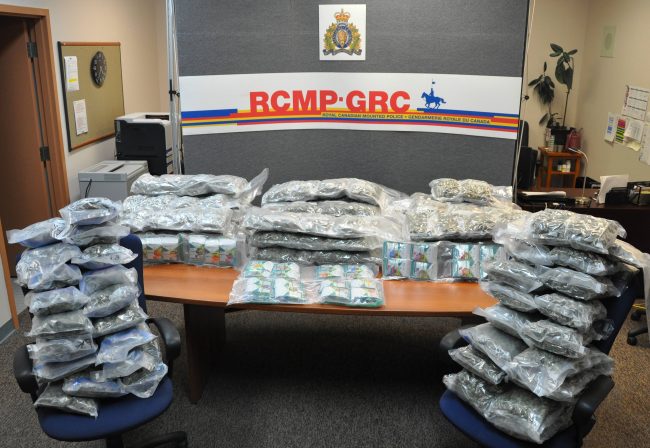OTTAWA – It’s too early to know how pot legalization will affect criminal involvement in the illicit marijuana market, the RCMP says.

The Mounties add that they will work with the federal government “to the extent possible” to ensure policies are in place to prevent crime networks from taking advantage of a newly legal marijuana trade.
The cautious RCMP assessment – spelled out in December notes recently obtained by The Canadian Press through the Access to Information Act – stands in contrast to the Trudeau government’s mantra that legalization will remove pot profits from criminal hands.
READ MORE: Legalized marijuana taxes must be set low to deter black market: study
The Liberals plan to introduce legislation Thursday to put legalization in motion.
The government wants to decriminalize marijuana consumption and incidental possession and create new sanctions to more severely punish those who provide pot to minors or drive under its influence.
The Liberals say the current system of prohibition does not stop young people from using marijuana and too many Canadians end up with criminal records for possessing small amounts of pot.
But the legislation will be just a starting point, as the federal and provincial governments sort out myriad questions about the availability, sale, pricing and taxation of pot, as well as penalties for misuse and the resources needed to implement the new regime.

Get breaking National news
WATCH: Marc Emery wonders how legal marijuana will be distributed

A federal task force on legalization and regulation of cannabis has recommended maintaining criminal offences for illicit production, trafficking, import and export, along with administrative penalties for breaches of licensing rules on production, distribution and sale.
But the task force acknowledged there would still be attempts to operate outside of the legal regime.
Justice Minister Jody Wilson-Raybould said Monday the new system would regulate the marijuana trade to “keep it out of the hands of children and the proceeds out of the hands of criminals.”
READ MORE: Licensed marijuana producers keen for details in Canada’s marijuana legislation
The internal RCMP notes indicate the Mounties aren’t so sure.
“The RCMP is concerned with the involvement of organized crime in the illicit cannabis market,” the notes say. “It is too early to determine what potential impact the government of Canada’s commitment to legalize cannabis may have on the involvement of organized crime in the illicit market.”
The notes advise the Mounties, if pressed on organized criminal activity, to say the national police force would work with the federal government “to ensure – to the extent possible – that appropriate policies and safeguards are in place to prevent organized crime networks to profit from upcoming legalization efforts.”
WATCH: Booze could lose when pot becomes legal

A study to be released Tuesday by the C.D. Howe Institute estimates legalized pot would generate about $675 million next year in combined revenue for federal and provincial coffers through existing sales taxes.
Under this scenario, the think-tank says, about 90 per cent of Canada’s pot market would be legitimate.
The report adds that if authorities want to raise more money through additional taxes, they risk fuelling black-market sales.







Comments